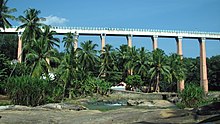
Mathoor Hanging Bridge is an Aqueduct in Southern India, in Kanyakumari District of Tamil Nadu state The Mathoor Hanging Trough is the tallest as well as the longest trough bridge in Asia, having a height of 115 feet and a length of one Kilometer. Constructed in 1966, this bridge has became a place of tourist importance. The bridge has been constructed at Mathoor across the river Parazhiyar at a cost of Rs. 12.90/- lakhs and the trough canal on the bridge carries water for irrigation from one side of a hill to the other side of a hill. The trough has a height of 7 feet with a width of 7feet six inches45. The canal is being shouldered by 29 huge pillars. The district administration has created tourism infrastructure facilities over here. It is 60 km from Kanyakumari46 .
ARCHITECHTURE
The Aqueduct is built across the Pahrali river, a small river that originates in the Mahendragiri Hills of the Western Ghats. Mathur Aqueduct itself carries water of the Pattanamkal canal for irrigation over the Pahrali river, from one hill to another, for a distance of close to one kilometer. This Aqueduct is necessitated due to the undulating land terrain of the area, which is also adjacent to the hills of the Western Ghats.
Mathur Aqueduct is a concrete structure held up by 28 huge pillars, the maximum height of the pillars reaching 115 ft. The trough structure is 7 ft in height, with a width of 7.5 ft. The trough is partly covered on top with concrete slabs, allowing people to walk on the bridge and also see the water going through the trough. Some of the pillars are set in rocks of the Pahrali river, though some of the pillars are set in hills on either side.
Road access allows one to drive in to one side of the Aqueduct (up to one end), while it is also possible to drive into the foot of the Aqueduct (the level where the Pahrali flows) on the opposite side. There is also a huge flight of stairs (made in recent times) that allows one to climb from the level of the Pahrali river to the trough.
Irrigation Water flows through the trough for a major part of the year, except in the summer (from February to May).
Road access allows one to drive in to one side of the Aqueduct (up to one end), while it is also possible to drive into the foot of the Aqueduct (the level where the Pahrali flows) on the opposite side. There is also a huge flight of stairs (made in recent times) that allows one to climb from the level of the Pahrali river to the trough.
Irrigation Water flows through the trough for a major part of the year, except in the summer (from February to May).

Nhận xét
Đăng nhận xét